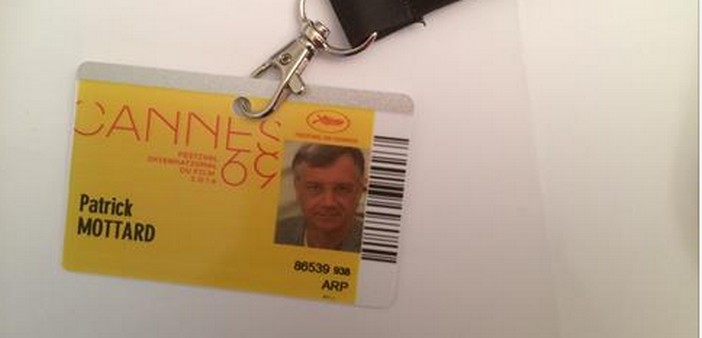A weekend with a rich and interesting program.
Well-deserved standing ovation this Saturday: we all got up to applaud the team of the German film “Toni Erdmann” by director Maren Ade.
The Handmaiden, Park Chan-Wook, South Korea
In 1930s Korea during the Japanese colonization, a young woman, Sookee (Kim Tae-Ri), is hired as a maid for a wealthy Japanese woman (Kim Min-Hee) living in seclusion in an enormous mansion. But in reality, Sookee has a secret that is not necessarily very respectable.
As is often the case with Asian films, due to cultural and aesthetic reasons, it is a bit difficult to get into the story of “The Handmaiden.” However, after the first half-hour, we are captivated by a plot that offers numerous twists and a very sensual love story. The physical love scenes between Sookee and Hideko are reminiscent of those in “Blue Is the Warmest Colour” by Kechiche.
The BFG, Steven Spielberg, USA (Out of competition)
Sophie, a little girl, is drawn into a fantastical world where, alongside a Big Friendly Giant (considering the appearance of the vegetables he eats, he might even be organic…), she is confronted by a gang of super giants quite ready to turn her into a canapé.
A family film with a relatively flat first part that gradually becomes more lively when little Sophie and the BFG (Big Friendly Giant, French title) have the good idea to ask for help from the Queen of England. It becomes quite funny at that point. Not more than that.
Toni Erdmann, Maren Ade, Germany
Ines works for a large German company based in Bucharest, specializing in relocations and layoffs. Very ambitious and unscrupulous, she lives only for her professional success. Her father Winfried, a bohemian prankster, shows up unexpectedly and challenges her by inventing a character, the mischievous Toni Erdmann, who, with his wig and fake teeth, regularly crosses her path. He especially endangers her life’s balance by asking her the essential question for him: “Are you happy?”
The confrontation between this daughter, who forgets to live, and this father, who still believes in happiness (portrayed flawlessly by Sandra Hüller and Peter Simonischek) is fascinating. Punctuated with outstanding moments, the nearly three hours of the film go by without boredom.
The ending is superb because it refuses any kind of simplistic dualism. The father himself acknowledges that throughout our lives, we are engulfed by tasks that distance us from happiness. And there is not much to do to avoid this. Perhaps a few breaks that can turn into moments of relief, precisely those Toni Erdmann knows how to impose on himself.
Slack Bay, Bruno Dumont, France
In 1910, at Slack Bay in northern France, mysterious disappearances cause a stir in the region. The enormous Inspector Machin and his assistant Malfoy investigate while zigzagging between a local fishing family and wealthy bourgeois from Lille vacationing in the area.
Continuing from his exciting mini-series “P’tit Quinquin” (Arte), Bruno Dumont firmly establishes a new genre in our cinematic vocabulary: the comical noir Ch’ti. It is a blend of comic book aesthetics (many shots resemble “clear line” panels), slapstick (Machin-Malfoy is reminiscent of Laurel and Hardy), mysticism (the director hasn’t forgotten that he directed “The Life of Jesus”), and social satire with a sharp edge. But more than anything, the “Dumont touch” is characterized by a remarkable aversion – in these times – to political correctness. We might even consider it provocative: the people from the North here do not have the warmth in their hearts that they lack outside! The banner of the PRG supporters is not far because the plot of “Slack Bay” is built on a confrontation between cannibalistic proletarians and incestuous bourgeois.
The professional actors (Fabrice Lucchini, Juliette Binoche, Valeria Bruni-Tedeschi, Jean-Luc Vincent) are simply hilarious. The other characters, as is customary with Dumont, are played by amateurs who impress with their accents as thick as blades and their blistering appearances.
In short, if I were a producer, I would not hesitate to sign up for the next ten Ch’ti noir films by Dumont: a promising investment!
I, Daniel Blake, Ken Loach, UK
Daniel, a 59-year-old carpenter (Dave Johns) has to rely on social assistance for the first time in his life following heart problems. During his trials, he meets Katie, a single mother of two children (Hayley Squires), also caught in the web of administrative absurdities.
With this film, Ken Loach denounces a society that is both liberal and terribly bureaucratic, ruthless towards the system’s outcasts or even its poorest members.
In “I, Daniel Blake,” I see a relentless indictment against the much-vaunted English model (particularly in health care) by our London-based “expats,” our media, and some of our politicians.
by Patrick Mottard


